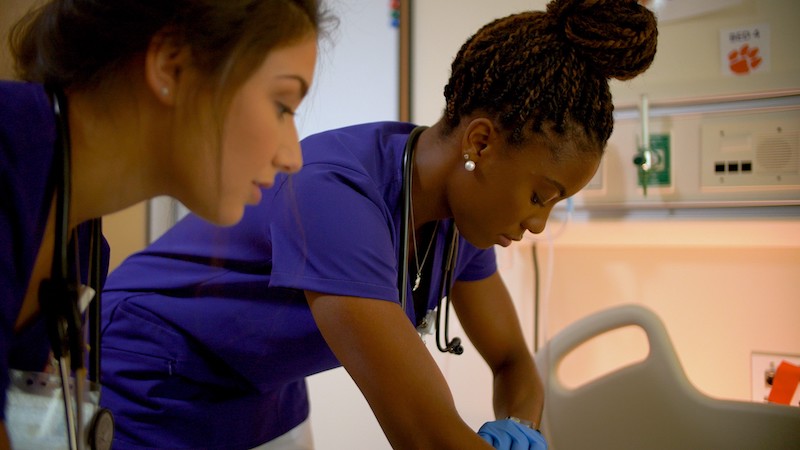Bachelor of Science, Major in Nursing
The Bachelor of Science with a Major in Nursing degree at Clemson University is an eight-semester program that awards a four-year degree. As freshman and sophomores, students focus primarily on the sciences and general education courses, and students are introduced to nursing in their first semester and have nursing courses throughout these first two years. During their final years, students are split into two cohorts due to clinical availability. The junior and senior semesters focus on nursing courses and clinical experiences. Students have clinical experiences with high-fidelity human patient simulators in the simulation spaces within Edwards Hall on Clemson's campus and the Clemson University Nursing building in Greenville as well as in various hospital and community agencies throughout the Upstate. More information on the two cohorts and cohort placement can be found on the Curriculum Plan tab.
Students can enter the program as freshmen, transfers or as a change of major after their freshman or sophomore year. Both routes of entry are highly competitive. Pass rates on the national licensure exam (the NCLEX) are consistently above the state and national levels.
Students and alumni express great appreciation for the education they receive from the School of Nursing, citing the positive relationships between students and faculty as the program's greatest strength. End-of-program exit surveys show that between 95 and 100 percent of graduates are satisfied or very satisfied with their overall experience at the School of Nursing and feel well prepared for the NCLEX and to care for diverse patients in a variety of settings.
-
Curriculum
As a direct admit program, students are accepted as freshmen into nursing and remain in the nursing major as long as they meet progression requirements (see nursing undergraduate handbook). While freshmen are introduced to the nursing profession in their first semester at Clemson through Nursing 1020: Nursing Success Skills, they primarily take general education and science courses during their first two years. During the remaining two years, studies focus more specifically on nursing. Students have the opportunity to work closely with faculty and students on research and service projects through creative inquiry, the honors program, and interdisciplinary courses.
-
Objectives
Upon completion of the program students will be able to:
- Use communication skills to interact effectively and appropriately with individuals, families, groups in the community, and other members of the health care team.
- Demonstrate personal and professional responsibility and accountability for personal nursing practice in accordance with the highest standards and codes of the profession.
- Use critical thinking to provide community based professional nursing care for diverse populations across the life span in multiple settings.
- Employ leadership and management skills and knowledge of health policy to enhance the quality of nursing care.
-
Clinical Facilities
Students obtain clinical practice in a variety of settings. Initially, and at intervals throughout the curriculum, students learn nursing skills in our clinical learning and research center. This center offers a hospital-like environment with high tech equipment, including virtual reality IV simulators and high fidelity human patient simulators. The human patient simulators represent different age groups, providing students at all levels with opportunities to practice critical thinking and hands-on skills in a non-threatening environment. This practice allows students to feel more comfortable in actual clinical areas and helps them identify and intervene in “low occurrence, high risk” situations more quickly.
For their hospital based experiences, students have clinical rotations in a variety of settings including medical centers, regional hospitals and community hospitals. In these experiences, students work closely with faculty members. The ratio of students to faculty is eight to one. Students obtain public health experiences in health departments, hospices, schools and community centers.
-
Clinical Agency Contract Requirements
To comply with clinical agency contract requirements and South Carolina law, students enrolled in nursing courses with a clinical laboratory must meet specific requirements listed in the School of Nursing Student Handbook.
-
Financial
Nursing Scholarships
Nursing scholarships are available through Clemson University and the School of Nursing.
Please visit the Financial Aid website for Clemson University scholarship information.
Additional scholarships and awards are available in the Spring semester through the School of Nursing. Details and application forms are emailed directly to students in the spring. Please see the list below and contact Mrs. Angie Newton for more information.
External nursing scholarships can be found on the AACN website.
Elizabeth Ashley Gillespie ('03, M'06) Annual Travel Grant-in-Aid
Grant-In-Aid
Study abroad travel aid for nursing students.
Eugene Edwards Memorial Award
Award
Award for outstanding nursing students.
Gracie Evelyn Boggs Jameson Endowed Scholarship
Scholarship
Scholarship for nursing students interested in oncology nursing.
Hearst Annual Scholarship
Scholarship
Scholarship for underrepresented nursing students pursuing BS or ASD degree.
Herbert N. Shearin, Jr. Award for Excellence in Nursing
Award
Award for junior or senior nursing students.
J.C. Hubbard Endowment Educational Fund
Scholarship
Scholarship for undergraduate nursing students.
Judy Yvonne Robertson Memorial Scholarship
Scholarship
Scholarship for nursing students at all levels.
Lettie Pate Whitehead Foundation Annual Nursing Scholarship
Scholarship
Need-based scholarship for nursing students who are residents of AL, FL, GA, LA, MS, NC, SC, TN, or VA.
Reva W. Burns Endowment Scholarship in Nursing
Scholarship
Scholarships for junior or senior nursing students.
Viola M. Wolf Nursing Annual Scholarship
Scholarship
Scholarship for U.S. citizen junior or senior nursing students with minimum GPA of 3.0.

